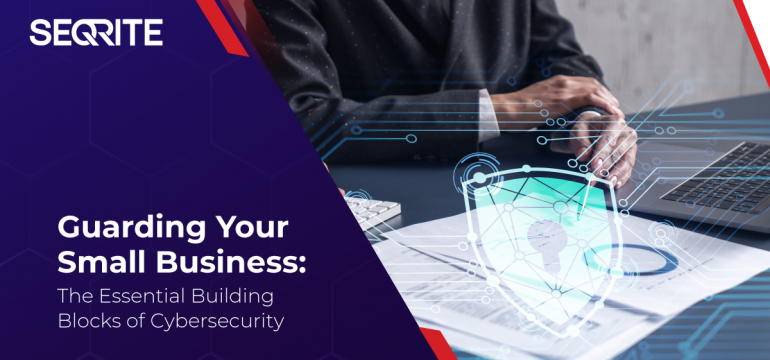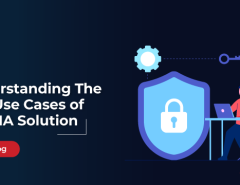The pandemic has expedited digital transformation, making technology and data pivotal to most businesses. However, it has also increased cyber threats, especially for small and medium-sized enterprises (SMBs). In addition, data regulations have also become more stringent, with fines growing and regulators targeting all firms regardless of their size.
Small businesses are more vulnerable to cyberattacks leading to productivity loss, financial trouble, and reputation harm. Since the attackers don’t differentiate between a large enterprise and a small one, the onus is on us to ensure that our critical data is safeguarded and business continuity is maintained at all times.
While daily operations and long-term growth plans are necessary, business owners and executives must prioritize cybersecurity on their agenda. But with the cyber landscape constantly evolving, knowing where to start can be daunting. Here’s a guide to help SMBs navigate the world of cyber threats efficiently.
Why do cyber hackers go after small and medium-sized businesses?
SMBs often have less stringent technological defenses and need more enterprise-level security, resources, and expertise to identify and defend themselves against complex threats. Being consumed by their business operations, small enterprises need data privacy and cyber security at the top of their mind, especially from an investment/budget perspective.
SMBs often have a misconception that their size makes them too insignificant to be a target, and therefore they rely on security through obscurity. This makes them an easier target for hackers looking for vulnerabilities to exploit.
A recent industry study reveals that nearly 43% of cyberattacks are targeted at SMBs. Yet only 14% of these accounted SMBs are equipped to protect against them.
Surprised? Don’t be.
There are countless types of cyberattacks, but phishing attacks, data theft and exfiltration, malware and ransomware attacks, APT, supply chain attacks, cloud-based attacks, trusted insider threats, and zero-day attacks are the most common types impacting SMBs.
Regardless of the size, shape, or industry your small business belongs to, attackers target businesses with security vulnerabilities.
With more digital assets than individual consumers and less security than larger enterprises, these attacks put their companies at risk.
Unless they focus on shoring up their defenses, SMBs may inadvertently leave their endpoints vulnerable to attacks from hackers. Additionally, SMBs can also be stepping stones for hackers to infiltrate larger enterprises. This is particularly true in cases where small businesses are a part of the supply-chain arrangement for larger enterprises.
The risks are real, so having a cybersecurity plan is essential. While it’s impossible to predict when an attack will occur, taking proper precautions can thwart or ultimately impede hackers’ attempts to access your network or make any damaging impact on the operations.
Steps to protect your small business from cybersecurity threats
For many small business owners, the biggest risk factor is not realizing the risk they face!
While cybersecurity capabilities and awareness seem to be improving, unfortunately, the threat and sophistication of cyberattacks match that progress. Hence, like any other entity, small businesses, too, deserve robust protection against complex cyberattacks.
The following ways SMBs can strengthen their business against a cyberattack to mitigate threats, reduce damage, and enhance resiliency and recovery –
- Spot the threats: It is crucial to identify potential vulnerabilities in your network and systems by performing regular security audits, risk assessments, and penetration testing. This will help you understand where your vulnerabilities are and prioritize your security efforts accordingly.
- Secure your networks: Install firewalls and other security solutions to secure your networks, including your Wi-Fi, routers, and servers. Make sure that remote workers and contractors also follow your security protocols when accessing your network.
- Deploy robust software: Invest in anti-malware, anti-virus, and anti-spyware software to prevent and detect malicious activities. These tools help protect against known and unknown threats and alert you when something suspicious occurs.
- Keep the software updated: Ensure that all software, including operating systems, browsers, and plugins, are updated regularly with the latest security patches and bug fixes. Outdated software is a prime target for cybercriminals to exploit vulnerabilities.
- Enable multi-factor authentication: Multi-factor authentication (MFA) adds an extra layer of security by requiring a user to provide multiple forms of identification, such as a password and a unique code sent to their mobile device.
- Secure and back up your data: Protect your data by encrypting sensitive information, restricting access to authorized personnel, and creating backups regularly. In case of a cyberattack, backups can help restore your data quickly and minimize the impact of the attack.
- Ensure a strong password policy: Encourage your employees to use strong passwords that are long and complex, and change them regularly. Use a password manager to keep track of passwords securely.
- Don’t overlook mobile devices: Mobile devices are often overlooked in cybersecurity plans. Ensure that employees’ devices are secured with strong passwords, encryption, and anti-virus software. Implement mobile device management (MDM) solutions to manage and secure these devices remotely.
- Select the best cybersecurity partner: Select an end-to-end enterprise cybersecurity solutions provider who can help with different security needs. Going for siloed solutions can be cumbersome for a small business, and the total cost of ownership might be higher. Ensure your solutions provider has a strong support team who can help when required. Remote help is non-negotiable, but even having field support can ensure peace of mind. E.d. SEQRITE is a leading enterprise cybersecurity solutions provider with end-to-end solutions for businesses of any size and 34 offices across India to support their customers.
In Conclusion
With more companies expanding their businesses online, the significance of robust cybersecurity measure increases. To minimize damage in the event of a breach, SMBs must take action to protect their company data and assets.
Security is a business imperative—a growth accelerator! Cyber resilient businesses can operate even under persistent threats and sophisticated attacks, which allows them to safely adapt to disruptions, gain customer trust, and increase shareholder value.
With sophisticated attacks posing unprecedented challenges for businesses everywhere, security strategies and practices are being tested like never before. Cyber threat intelligence plays a crucial role in determining the measures organizations can implement to outmaneuver uncertainty, emerge stronger from crises and gain greater resilience against cybersecurity threats.
So, are you revamping your defense strategies?
About SEQRITE
SEQRITE is a leading enterprise cybersecurity solutions provider with an autonomous and highly advanced range of enterprise security solutions. SEQRITE’S modern approach helps find the right balance between defense and business growth.
Custom-built for small businesses, simple to deploy, and easy to manage, the product portfolio provides stress-free security and protection against ransomware, malware, and the latest cyber threats at an affordable price.
Our unified console reduces the work required to monitor and remediate security events enabling organizations to anticipate threats, protect data as it moves, and respond quickly and precisely without holding back business innovation.
Suppose you need help deciding which solution to choose. In that case, you can start with our Enterprise Security (EPS Cloud) solution, which will help you discover new capabilities and features while ensuring your experience is optimized based on your use of the centralized platform.
The solution is focused on simplifying the security stack and proactively safeguarding the IT assets of businesses without forgoing enterprise capabilities. The technology is designed to scale businesses and help secure the networks used by millions of customers globally.
Are you ready?




